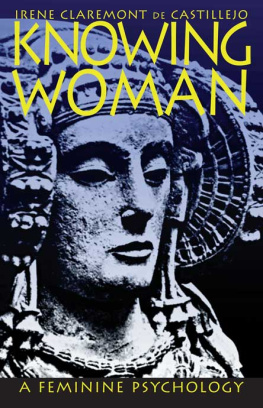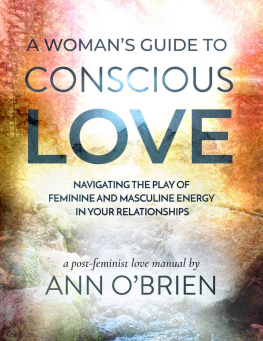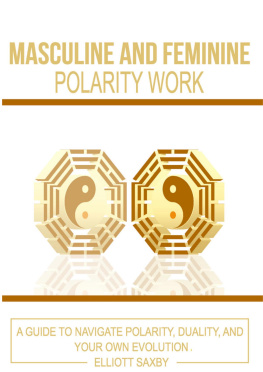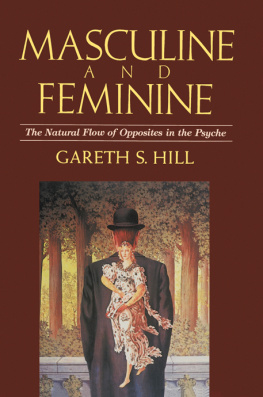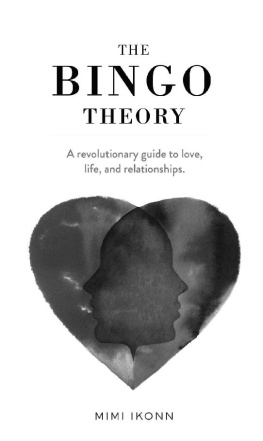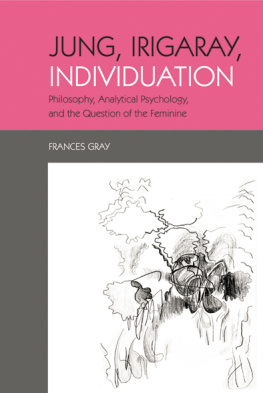ABOUT THE BOOK
In this classic work, a noted Jungian analyst explores the division of the human psyche into masculine and feminine. Characteristic of feminine consciousness, she writes, is diffuse awareness, which recognizes the unity of all life and promotes acceptance and relationship. The masculine attitude is one of focused consciousness, the capacity to formulate ideas and to change, invent, and create. Concerned with the experience of women in a culture dominated by masculine values, the author discusses topics such as the animus (the masculine soul image in a womans unconscious); womens roles in relation to work, friends, children, and lovers; and issues such as abortion, aging, and self-determination.
IRENE CLAREMONT DE CASTILLEJO was a Jungian analyst who studied feminine psychology with Emma Jung and Toni Wolff in Zurich.
Sign up to receive news and special offers from Shambhala Publications.

Or visit us online to sign up at shambhala.com/eshambhala.

A C. G. JUNG FOUNDATION BOOK
The C.G. Jung Foundation for Analytical Psychology is dedicated to helping men and women grow in conscious awareness of the psychological realities in themselves and society, find healing and meaning in their lives and greater depth in their relationships, and live in response to their discovered sense of purpose. It welcomes the public to attend its lectures, seminars, films, symposia, and workshops and offers a wide selection of books for sale through its bookstore. The Foundation also publishes Quadrant, a semiannual journal, and books on Analytical Psychology and related subjects. For information about Foundation programs or membership, please write to the C. G. Jung Foundation, 28 East 39th Street, New York, NY 10016.
I RENE C LAREMONT DE C ASTILLEJO
KNOWING WOMAN
A Feminine Psychology

SHAMBHALA
Boston & London
2015
Shambhala Publications, Inc.
Horticultural Hall
300 Massachusetts Avenue
Boston, Massachusetts 02115
www.shambhala.com
1973 by the C. G. Jung Foundation for Analytical Psychology
All rights reserved. No part of this book may be reproduced in any form or by any means, electronic or mechanical, including photocopying, recording, or by any information storage and retrieval system, without permission in writing from the publisher.
Some of the sections of this book have been published in pamphlet form by the Guild of Pastoral Psychology, and others have appeared in Harvest, the annual publication of the Jungian Analytical Psychology Club, London, with whose kind permission they are reprinted here.
Robert Frosts poem EscapistNever is quoted from The Poetry of Robert Frost edited by Edward Connery Lathem by permission of Jonathan Cape Ltd and Holt, Rinehart and Winston, Inc. Copyright 1962 by Robert Frost. Copyright 1969 by Holt, Rinehart and Winston, Inc. The extract from Christopher Frys play The Dark Is Light Enough is quoted by permission of the Oxford University Press.
Library of Congress Cataloging-in-Publication Data
Castillejo, Irene Claremont de, b. 1896.
Knowing woman: a feminine psychology/Irene Claremont de Castillejo.
p. cm.
Reprint. Previously published: New York: Putnam for the C. G. Jung Foundation for Analytical Psychology, 1973.
A. C. G. Jung Foundation book.
Includes bibliographical references.
eISBN 978-0-8348-3044-8
ISBN 1-57062-204-3 (alk. paper)
1. WomenPsychology. 2. Interpersonal relations.
I. Title.
HQ1206.C28 199089-29267
155.633dc20CIP
BVG 01
CONTENTS
I describe here what I have learned of womans present psychology. Perhaps I am only describing myself. But in twenty years as a Jungian analyst I have been concerned by the break-up of marriages, by misunderstandings between man and man, and between men and women. I have tried to follow the psychology of different kinds of women and their effects on men, and I have wondered about our personal as well as our collective responsibility for the state of society around us.
Women are today face to face with some unforeseen consequences of their new equality with men.
I
T HE OTHER DAY a friend asked me a question which set me thinking. Is it exhausting to listen and talk to people all day? I answered as anyone else might have done. Sometimes very exhausting, sometimes not at all.
Then I began to wonder on what this question of fatigue depended. Certainly not on the amount I personally put out. It almost seemed at first sight as though it were an inverse ratio. One is often less tired when one contributes a lot to a conversation than if one is a passive listener.
As I considered actual conversations with other persons, not only those in working hours, I began to realize that the question was not one of fatigue or lack of fatigue, but rather of fatigue or refreshment.
And suddenly it was so clear and obvious that I could not imagine why I had not seen it before. We are only exhausted when talking to other people if we do not meet them, when one or both of us are hiding behind screens.
On the rare occasions when we are fortunate enough to meet someone, there is no question of fatigue. Both are refreshed, for something has happened. It is as though a door had opened, and life suddenly takes on new meaning.
Why is it then that we meet so seldom? The curious thing is that we spend our lives not meeting people. All day we mix with others, in the bus, in shops, at work or play; but it may be that not once in the course of days or weeks or months do we meet any one of these people in such a way that a vibration is set up between the two. Nothing happens.
After the business of the day we go home and join our families, where it is quite easy for the various members to rub alongside one another without meeting each other at all, and without anybody noticing the fact.
Meetings are of course on various levels. There are meetings of the body and meetings of the mind; meetings in realms of the intellect and during the companionship of daily living or working together. Meetings can be of every conceivable degree of closeness or duration, on one level only or on all at once. There can be meetings of mystical spiritual intensity. But on no level does mere physical proximity or mutual exchange of ideas necessarily constitute a meeting. Frequently husbands and wives have the closest physical intimacy for years and yet have no real meeting. Each is wrapped away in an isolation of his own.
For there to be a meeting, it seems as though a third, a something else, is always present. You may call it Love, or the Holy Spirit. Jungians would say that it is the presence of the Self. If this Other is present, there cannot have failed to be a meeting.
Duration has nothing to do with it. Nor have common interests. The touch of a hand may suffice. I can recall some conversations with total strangers which have never lost their flavour because in some inexplicable way there had for a little while been a real meeting.
I have never forgotten the smile of a bus conductor as I alighted from a bus at the age of twenty. It was a smile shared. We never saw one another again, nor needed to, but for a few seconds we really met. I have written a little poem about it:
A million footprints
On solitary sand
Are washed away,
Yet the fragrance of a smile
Next page
